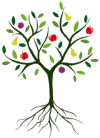Winter Gem
Winter Gem is one of the best-flavoured new apple varieties developed in the 1990s by the late Hugh Ermen.
It is a cross between Grimes Golden and Cox's Orange Pippin, and as you might expect has a pronounced aromatic flavour. Grimes Golden is not that well-known in the UK but is the probable parent of Golden Delicious. Some enthusiasts reckon that Grimes Golden is a better apple than Golden Delicious, as it has the same sweetness but with a bit more richness. This means that Winter Gem inherits characteristics from two of the most influential apple families in the world, and if you appreciate apple flavours it is well worth trying.
As the name suggests, Winter Gem is a late-season apple, and the apples can be stored for several months.
Winter Gem apple trees for sale
RF12-year bare-root
tree
on M9 rootstock£43.00
Mature height: 1.5m-2.5m after 10 years
Suitable for growing a small bush-trained dwarf apple tree, will need a permanent stake. Available next season
RF21-year bare-root
tree
on M26 rootstock£34.95
Mature height: 2m-3.5m after 10 years
Suitable for a semi-dwarf apple tree, a medium apple spindlebush, a medium apple fan or espalier, a large apple cordon or U-cordon. Available next season
RF32-year bare-root
tree
on MM106 rootstock£43.00
Mature height: 3m-5m after 10 years
Suitable for a large bush-trained free-standing apple tree. Available next season
Growing and Training
Unlike either of its parents, Winter Gem is well-suited to UK gardens - indeed this is a characteristic of many varieties developed by Hugh Ermen.
It can be a light cropper (although this is perhaps part of the reason for its good flavour). Make sure there are suitable pollination partner varieties nearby - Red Devil, Srumptious, Falstaff, Saturn and Charles Ross would be good choices. In other respects it is quite easy to grow.
Winter Gem works particularly well as a small tree on a dwarf or semi-dwarf rootstock. On more vigorous rootstocks it will produce a large and attractive tree.
History
Winter Gem is a cross between Grimes Golden and Cox's Orange Pippin, and was developed in the UK by Hugh Ermen.
Winter Gem characteristics
- Gardening skillAverage
- Fruit persistenceNormal ripening
- Self-fertile?Not self-fertile
- Pollinating othersAverage
- Pick seasonLate
- Picking periodmid-October
- Keeping1-2 months
- Food usesEating fresh
- Country of originUnited Kingdom
- Period of origin1950 - 1999
- Fruit colourOrange flush
You might also like these varieties
BraeburnBraeburn is one of the best-flavoured supermarket apple varieties.
GreensleevesGreensleeves is a reliable and popular mid-season green/yellow apple, easy to grow and productive.
HoneycrispHoneycrisp is an American cold-hardy disease-resistant apple - it shows just how good modern apples have become.
More about apple trees
Apples are very versatile, and all varieties can be eaten or used in the kitchen. However varieties specifically grown as eating apples tend to have the best flavours for eating raw.
The main thing to decide when choosing an eating apple is when you intend to eat the apples. Early season apples are typically ready in August, and generally don't keep very long. Mid-season apples are ripe in early September, while late-season apples start to become ripe in late September and October. Many of the late-season varieties can also be stored in a fridge or cold shed for several months into the winter.
Some apple varieties are self-fertile, but most are not. However in most areas of the UK you do not need to worry whether your apple trees are self-fertile or not, as there will be other apple trees in nearby gardens to help with pollination.
